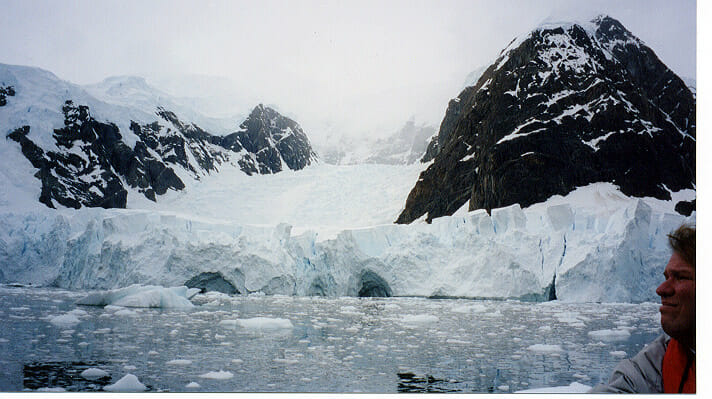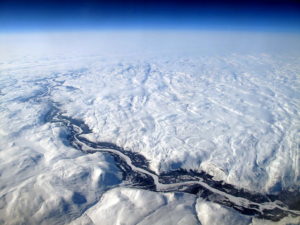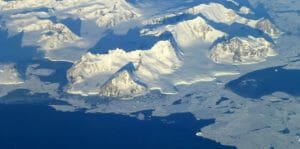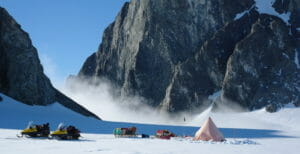Polar Ice Is Melting Fast in Both Hemispheres
Two new British studies deliver ominous evidence of the long-term consequences of climate change due to the profligate use of fossil fuels. Pathfinder Linden via Wikimedia Commons
Pathfinder Linden via Wikimedia Commons
New studies have confirmed, once again, the rapid melting of the polar ice in both hemispheres.
A British team has used satellite data to reveal that the retreat of the all-important grounding line of many Antarctic glaciers has accelerated to five times the historic level. And US scientists have confirmed that in Arctic waters the West Greenland ice sheet is now melting faster than at any time in the last 450 years.
Both studies deliver ominous evidence of the long-term consequences of climate change due to profligate human use of fossil fuels. The Greenland icecap holds enough water to raise global sea levels by seven metres. The West Antarctic ice sheet – where the latest study has identified most of the change – holds enough water to raise sea levels by up to five metres.
The UK measure of Antarctic ice retreat is important because it confirms on a wider scale what individual measurements of glacier retreat have already shown: that increasingly warm southern ocean waters are melting the ice at depth.
Depth in this study is critical: glaciers move slowly because the frozen rivers are “anchored” or grounded in bedrock as they flow off the continent, and then grounded again up to a kilometre deep off the continental shelf.
This applies a brake to the flow towards the open sea. The further from the coast the grounding line, the slower the glacier’s flow, the more stable the ice shelf, and the slower the consequent sea level rise.
Hannes Konrad of the University of Leeds in the UK and colleagues report in the journal Nature Geoscience that they used the European Space Agency’s satellite Cryosat-2 data to track the changes in the grounding line along 16,000 kilometres of southern polar coastline.
Around West Antarctica, more than a fifth of the ice sheet has retreated faster than the 25 metres or so a year that has been normal since the end of the last ice age. In some cases the retreat of the grounding line has been five times that rate. The retreat has been extreme in eight of the ice sheet’s 65 biggest glaciers.
Clear evidence
“Our study provides clear evidence that retreat is happening across the ice sheet due to ocean melting at its base, and not just at the few spots that have been mapped before now,” Dr Konrad said.
“This retreat has had a huge impact on inland glaciers, because releasing them from the sea bed removes friction, causing them to speed up and contribute to global sea level rise.”
Far to the north, ice is also melting. Erich Osterberg of Dartmouth College in the US and colleagues report in the journal Geophysical Research Letters that they collected seven ice cores from a remote zone in the West Greenland ice sheet where meltwater trickles down into the deeper snow and then freezes again: this “new” ice in the compacted snow provides scientists with a record of melting over time.
Longer record
Researchers have been watching the apparent acceleration of the summer melting of Greenland’s ice for decades: they have monitored ever faster rates of glacier flow and tried to identify direct influences on the surface of the ice sheet that might accelerate overall melting.
But direct observation of the northern hemisphere’s largest concentration of ice began only about five decades ago. The Dartmouth cores provide a total of almost five centuries of summer melt patterns.
“The ice core record ends about 450 years ago, so the modern melt rates in these cores are the highest of the whole record that we can see. The advantage of the ice cores is that they show us just how unusual it is for Greenland to be melting this fast,” Dr Osterberg said.
“We see that West Greenland melt really started accelerating about 20 years ago. Our study shows that the rapid rise in the West Greenland melt is a combination of specific weather patterns and an additional long-term warming trend over the last century.”
Your support is crucial...As we navigate an uncertain 2025, with a new administration questioning press freedoms, the risks are clear: our ability to report freely is under threat.
Your tax-deductible donation enables us to dig deeper, delivering fearless investigative reporting and analysis that exposes the reality beneath the headlines — without compromise.
Now is the time to take action. Stand with our courageous journalists. Donate today to protect a free press, uphold democracy and uncover the stories that need to be told.







You need to be a supporter to comment.
There are currently no responses to this article.
Be the first to respond.